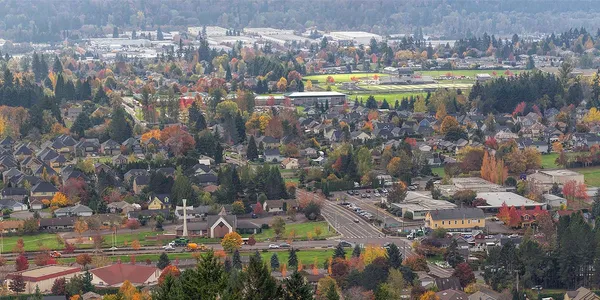Collaborate with Local Groups
How to become fire adapted
Who should participate in a fire-adapted community? Everyone! Create a collaborative local group representing all stakeholders, including:
- Property owners
- Schools
- Businesses
- Community centers
- Churches
- Land management agencies (federal, state and local)
- Tribes
Senior groups can provide organizational and leadership skills, while youth groups may need to complete community service projects. Invite as many as possible to your community meetings to create a whole community approach that incorporates everyone’s needs and strengths.

When assessing a community’s assets at risk, you should include public buildings, multiple dwelling units, and businesses and their owners and managers in the creation of the community’s risk assessment and Community Wildfire Protection Plan.
Wildfire safety planning: tips for starting good conversations
A guide for developing conversation-starter questions for in-person or virtual community wildfire safety planning meetings.
Meetings can provide value to wildfire safety efforts, especially if you ask good, open-ended questions that require more than a yes or no answer. Although in-person interactions are valuable, virtual meetings may be a good way to increase public participation by making access available to different members of the community.
Create good relationships by listening to resident’s perspectives – what they know, value and worry about. This will help you to more effectively address wildfire safety risks and plan project work that improves the community’s resiliency.
Starting good conversations
Use the following questions to start the conversation about the unique risks in your community as well as potential actions and opportunities to create a safer place to live, work and play. These questions are an initial guide for developing your own questions that will best fit the context of your community.
Get to know the community’s risk
On a scale of one to 10, how would you rate the wildfire risk in your community? What are your reasons for that rating?
What do you think is your community’s biggest wildfire risk?
What is your biggest concern if a wildfire occurs where you live?
Learn about preparedness efforts
Have you done anything, or are you planning to do anything, to prepare for wildfire? What are those actions? (These might be making their home more ignition resistant, modifying their vegetation, making an evacuation plan, etc.)
Would you like to learn more about things you can do to reduce your wildfire risk? If so, what would you like to know?
Are there things you would like to do but have not or cannot? If so, is there a key barrier or limitation that keeps you from taking this action? How can we help?
Help with evacuation planning
If there was a fire in your area, what do you plan to do? What is your biggest concern about this plan? How certain are you that you would stick to it?
Would you like to learn more about things to consider in developing your evacuation plan (i.e., evacuation routes, children, dispersed family, pets/pets’ lives)?
Connect the community with resources
Are you aware of other agency contacts you can connect with that may be able to offer additional insight or resources to assist your community with wildfire safety work?
Think about opportunities to continue to stay in touch with residents as your community’s wildfire risk assessment and planning projects are implemented.
Continue to develop the relationship with residents in your community. Find opportunities to keep the conversation going, particularly when funding or other resource opportunities become available. Include residents in discussions about implementing and then evaluating the effectiveness of project work.
Topics for follow-up conversations
Projects
Would you like to be a part of planning or organizing project work?
Are you aware of funding opportunities or other resources like volunteer assistance available to your community to help you complete wildfire safety project work?
Local agencies
Are you familiar with how your local fire department or relevant local organization is working to decrease the fire risk or might be able to help?
Are you aware of the wildfire response needs of your local fire department and land management agencies?
What part of wildfire safety project work do you think needs some improvement?
Codes and standards
What would you like to know about standards for development in wildfire-prone areas?
What do you think about proposed land and infrastructure development in your community?
What would you like to know about the development process and/or building requirements?
